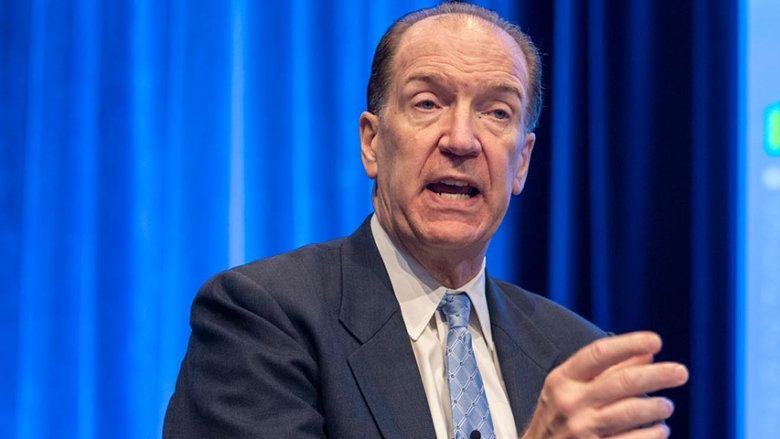Finance
Climate Financing: Nigeria gets $700m as World Bank disburses $31.7bn
Published
3 years agoon

The World Bank Group has delivered a record $31.7 billion in fiscal year 2022 (FY22) to help countries address climate change.
This is a 19% increase from the $26.6 billion all-time high in financing reached in the previous fiscal year.
Read Also:
Of this amount, Nigeria received $700 million, according to the details of a report by the Washington-based institution.
The World Bank Group has remained the largest multilateral financier of climate action in developing countries.
David Malpass, President of the World Bank Group said in a statement, “In our last fiscal year ending June 2022, we provided a record $31.7 billion to countries to identify and enable high-priority climate-related projects as part of their development plans.
“We will continue providing solutions to pool funding from the global community for impactful and scalable projects that reduce GHG emissions, improve resilience, and enable the private sector.”
According to the institution, financing for climate action in Full Year spanning July 1, 2021 to June 30, 2022 reached 36% of total Bank Group financing.
This exceeds the target set in the Group’s Climate Change Action Plan for 2021-2025 to deploy an average of 35% of the institution’s financing in support of climate action.
Highlights
The International Bank for Reconstruction and Development, a lending arm of the World Bank and the International Development Association (IDA), an international financial institution which offers concessional loans and grants to the world’s poorest developing countries delivered $26.2 billion in climate financing within the period under review.
Nearly half of that ($12.9 billion) specifically supported investments in adaptation and resilience.
The International Finance Corporation (IFC), the private sector arm of the World Bank Group, delivered an unprecedented $4.4 billion in climate finance and mobilized an additional $3.3 billion from other sources.
The Multilateral Investment Guarantee Agency (MIGA), the World Bank Group’s political risk insurance and credit enhancement arm, delivered $1.1 billion in climate finance.
Nigeria in Focus
In a report on its website titled, ‘World Bank Group Exceeds New Climate Finance Target – $31.7 Billion in Funding for Climate Action’, the Washington based bank said, “Helping 3.4 million people adapt to a changing climate in Nigeria: Climate change is causing severe water stress in Nigeria, causing droughts to increase in frequency and intensity.
“This affects Nigeria’s economic growth – it could cost the country as much as 30 per cent of its GDP by 2050, affecting the livelihoods of millions of households, worsening food security and livelihoods, and increasing the risk of violent conflict.
“Sustainable landscape management can help boost the resilience of local communities and adapt to changing dryland conditions. A $700m Agro-Climatic Resilience in Semi-Arid Landscapes Project aims to develop 20 watershed management plans covering all of Northern Nigeria.
“It will prioritize investments that can slow desertification while supporting natural resource-based livelihoods, for instance investing in sustainable oases and wetlands can be vital for adaptation and provide alternative incomes for communities.
“The project is designed to ensure community level participation, building local capacity and coordination between different groups, and ensuring transparency across different agencies so that climate solutions also strengthen the institutional systems in place.
“88 per cent of the financing for the project supports activities focused on building climate resilience and adaptation.”
The World Bank revealed that 2022 is set to rank among one of the 10 warmest years on record with climate impacts threatening to push millions into poverty.
It said it is committed to supporting Nigeria and other developing countries to mitigate greenhouse gas emissions and increase resiliency to climate impacts, while also meeting core development priorities.
Country Climate Reports Underway
As part of its ongoing effort to help countries integrate climate and development objectives, the Bank Group recently launched a number of Country Climate and Development Reports (CCDRs).
CCDRs are a new core diagnostic to help countries prioritize the most impactful actions that can reduce Greenhouse gas emissions and boost adaptation.
According to the statement, the summary of the preliminary findings of these reports will be published in the coming months to foster action-oriented discussion in the global community.
Share this:
- Click to share on X (Opens in new window) X
- Click to share on Facebook (Opens in new window) Facebook
- Click to share on WhatsApp (Opens in new window) WhatsApp
- Click to share on Pocket (Opens in new window) Pocket
- Click to share on Telegram (Opens in new window) Telegram
- Click to email a link to a friend (Opens in new window) Email
- Click to share on LinkedIn (Opens in new window) LinkedIn
You may like


World Bank Approves $500m To Expand Finance For MSMEs In Nigeria


Stability Without Relief? 10 Things the World Bank Says About Nigeria’s Reforms


139m Nigerians Still in Poverty Despite Tinubu’s Reform Gains – World Bank


World Bank Approves $300m to Support IDPs in Nigeria


World Bank Maintains Nigeria’s Growth Forecast at 3.6% Despite Global Economic Downgrades


World Bank to Withhold $10.4m Loan to Nigeria over Audit Deficiencies








